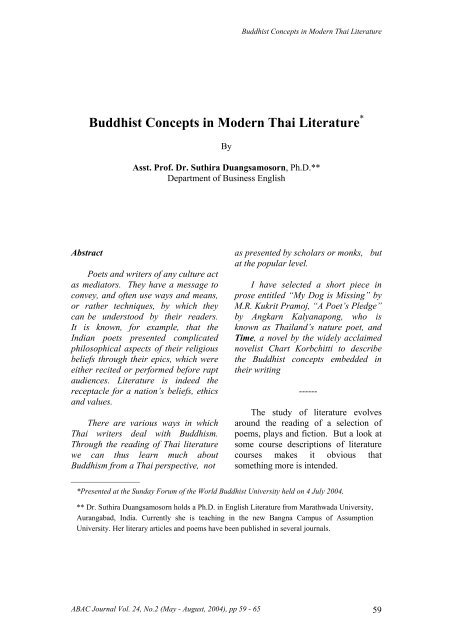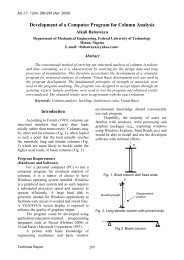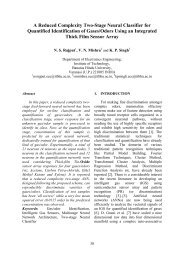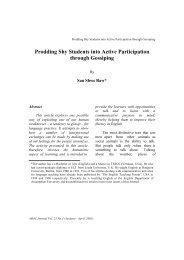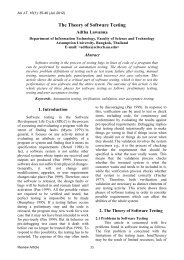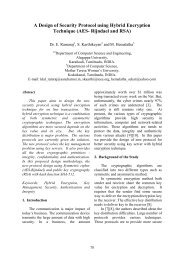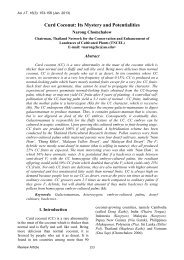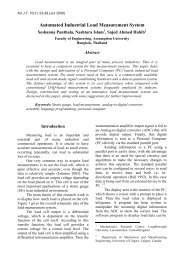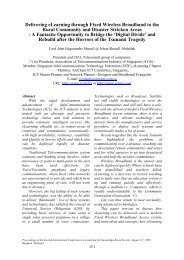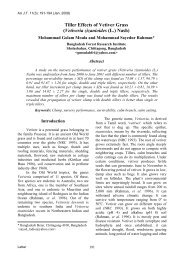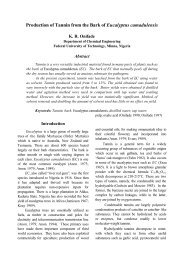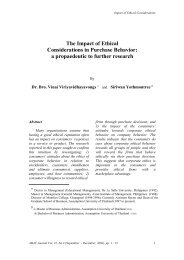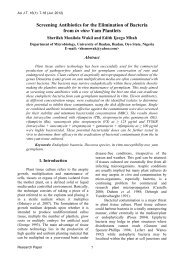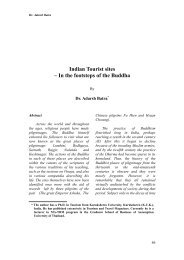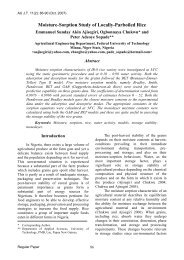Buddhist Concepts in Modern Thai Literature - AU Journal
Buddhist Concepts in Modern Thai Literature - AU Journal
Buddhist Concepts in Modern Thai Literature - AU Journal
You also want an ePaper? Increase the reach of your titles
YUMPU automatically turns print PDFs into web optimized ePapers that Google loves.
<strong>Buddhist</strong> <strong>Concepts</strong> <strong>in</strong> <strong>Modern</strong> <strong>Thai</strong> <strong>Literature</strong><br />
<strong>Buddhist</strong> <strong>Concepts</strong> <strong>in</strong> <strong>Modern</strong> <strong>Thai</strong> <strong>Literature</strong> *<br />
By<br />
Asst. Prof. Dr. Suthira Duangsamosorn, Ph.D.**<br />
Department of Bus<strong>in</strong>ess English<br />
Abstract<br />
Poets and writers of any culture act<br />
as mediators. They have a message to<br />
convey, and often use ways and means,<br />
or rather techniques, by which they<br />
can be understood by their readers.<br />
It is known, for example, that the<br />
Indian poets presented complicated<br />
philosophical aspects of their religious<br />
beliefs through their epics, which were<br />
either recited or performed before rapt<br />
audiences. <strong>Literature</strong> is <strong>in</strong>deed the<br />
receptacle for a nation’s beliefs, ethics<br />
and values.<br />
There are various ways <strong>in</strong> which<br />
<strong>Thai</strong> writers deal with Buddhism.<br />
Through the read<strong>in</strong>g of <strong>Thai</strong> literature<br />
we can thus learn much about<br />
Buddhism from a <strong>Thai</strong> perspective, not<br />
as presented by scholars or monks, but<br />
at the popular level.<br />
I have selected a short piece <strong>in</strong><br />
prose entitled “My Dog is Miss<strong>in</strong>g” by<br />
M.R. Kukrit Pramoj, “A Poet’s Pledge”<br />
by Angkarn Kalyanapong, who is<br />
known as <strong>Thai</strong>land’s nature poet, and<br />
Time, a novel by the widely acclaimed<br />
novelist Chart Korbchitti to describe<br />
the <strong>Buddhist</strong> concepts embedded <strong>in</strong><br />
their writ<strong>in</strong>g<br />
------<br />
The study of literature evolves<br />
around the read<strong>in</strong>g of a selection of<br />
poems, plays and fiction. But a look at<br />
some course descriptions of literature<br />
courses makes it obvious that<br />
someth<strong>in</strong>g more is <strong>in</strong>tended.<br />
*Presented at the Sunday Forum of the World <strong>Buddhist</strong> University held on 4 July 2004.<br />
** Dr. Suthira Duangsamosorn holds a Ph.D. <strong>in</strong> English <strong>Literature</strong> from Marathwada University,<br />
Aurangabad, India. Currently she is teach<strong>in</strong>g <strong>in</strong> the new Bangna Campus of Assumption<br />
University. Her literary articles and poems have been published <strong>in</strong> several journals.<br />
ABAC <strong>Journal</strong> Vol. 24, No.2 (May - August, 2004), pp 59 - 65 59
Suthira Duangsamosorn<br />
Here are two examples from a<br />
university syllabus:<br />
The course offers a survey and study<br />
of English and American works of<br />
literature <strong>in</strong> prose, poetry and drama.<br />
It <strong>in</strong>cludes read<strong>in</strong>g and discussions of<br />
some outstand<strong>in</strong>g, representative<br />
works where the philosophical, social,<br />
religious, political, and scientific<br />
aspects have been depicted. Attention<br />
will be given to the writ<strong>in</strong>g<br />
techniques <strong>in</strong> the various literary<br />
genres, particularly the short story<br />
and the novel.<br />
Or<br />
This course acqua<strong>in</strong>ts the students -<br />
through the medium of English - with<br />
recent literary works by <strong>Thai</strong> writers,<br />
who either write <strong>in</strong> English or whose<br />
works have been translated. The<br />
read<strong>in</strong>g of this selection of short<br />
stories, poems and novels which will<br />
lead to a larger understand<strong>in</strong>g of <strong>Thai</strong><br />
culture and the political, social and<br />
religious concept embedded <strong>in</strong> the<br />
writ<strong>in</strong>g. The learn<strong>in</strong>g methods<br />
<strong>in</strong>clude critical analysis and a term<br />
paper.<br />
It is true that professors <strong>in</strong>tend a lot<br />
more <strong>in</strong> their courses than just the<br />
appreciation and enjoyment of some<br />
excellent pieces of writ<strong>in</strong>g we call<br />
literature. The course descriptions<br />
show that professors make sure that<br />
their students learn someth<strong>in</strong>g from<br />
read<strong>in</strong>g literature. Without be<strong>in</strong>g<br />
overtly didactic, literature is <strong>in</strong>deed our<br />
teacher. It gives us robust models of<br />
know<strong>in</strong>g and do<strong>in</strong>g. Some work may<br />
present a large canvas of life and the<br />
times, another a particularly important<br />
philosophical view of a certa<strong>in</strong> writer.<br />
One of the really reward<strong>in</strong>g discoveries<br />
I made after seven years of teach<strong>in</strong>g<br />
<strong>Thai</strong> literature <strong>in</strong> an <strong>in</strong>ternational<br />
environment, is the various ways <strong>in</strong><br />
which <strong>Thai</strong> writers deal with Buddhism.<br />
Through the read<strong>in</strong>g of <strong>Thai</strong> literature<br />
we can thus learn much about<br />
Buddhism from a <strong>Thai</strong> perspective, not<br />
as presented by scholars or monks, but<br />
at the popular level.<br />
Here I want to draw an analogy to<br />
deal<strong>in</strong>g with some difficult concepts for<br />
one of my earlier papers, which was on<br />
“The Importance of the Ramayana <strong>in</strong><br />
Today’s World.” At least, I had to f<strong>in</strong>d<br />
an approach to the work. I asked a<br />
colleague from India what the<br />
Ramayana was. The answer was<br />
simple. “The Ramayana is the story of<br />
our God,” she said. Then was it a sort<br />
of Bible? Or an epic like Homer’s<br />
Odyssey? Without a doubt, a great work<br />
by the poet Valmiki, there are actually<br />
<strong>in</strong> existence other versions of the<br />
Ramayana (by Kamban and Tulsidas,<br />
and <strong>in</strong> different Indian languages and<br />
their translations). The Indian epics<br />
really belong to the oral cultures of<br />
antiquity. An Indian professor of<br />
Philosophy threw light on the whole,<br />
“The Vedas and Upanishads are elitist.<br />
Their metaphysical content is not easily<br />
understood by the common man. The<br />
Indian epics, however, operate on a<br />
popular level. They conta<strong>in</strong> the same<br />
60
<strong>Buddhist</strong> <strong>Concepts</strong> <strong>in</strong> <strong>Modern</strong> <strong>Thai</strong> <strong>Literature</strong><br />
philosophy of the ancient scriptures <strong>in</strong> a<br />
social background which is commonly<br />
known and understood by the Indian<br />
people.”<br />
“Poets are the antennae of a<br />
nation”, a pronouncement made by Ezra<br />
Pound places the poet, or writer of any<br />
culture as a mediator. Writers <strong>in</strong> their<br />
works embrace whatever is the common<br />
conscious of that nation. I have<br />
therefore applied similar assumptions to<br />
this selection that <strong>Thai</strong> writers present<br />
difficult <strong>Buddhist</strong> concept <strong>in</strong> a form that<br />
can be understood by all.<br />
The <strong>Thai</strong> writers or poets I will<br />
discuss have dealt <strong>in</strong> their works with<br />
<strong>Buddhist</strong> concepts to vary<strong>in</strong>g degrees –<br />
from the more ostensible to the most<br />
complicated – which we often def<strong>in</strong>e<br />
as “th<strong>in</strong>k<strong>in</strong>g the unth<strong>in</strong>kable” <strong>in</strong><br />
Buddhism. I have selected a short piece<br />
<strong>in</strong> prose entitled “My Dog is Miss<strong>in</strong>g”<br />
by M.R. Kukrit Pramoj, “A Poet’s<br />
Pledge” by Angkarn Kalyanapong who<br />
is known as <strong>Thai</strong>land’s nature poet, and<br />
Time, a novel by the widely acclaimed<br />
novelist Chart Korbchitti.<br />
“My Dog Is Miss<strong>in</strong>g” was<br />
orig<strong>in</strong>ally published <strong>in</strong> Siam Rath, a<br />
<strong>Thai</strong> newspaper founded and edited by<br />
M.R. Kukrit. The piece was later<br />
repr<strong>in</strong>ted <strong>in</strong> a collection of his writ<strong>in</strong>gs<br />
and has s<strong>in</strong>ce been accepted <strong>in</strong>to the<br />
canon of modern <strong>Thai</strong> literature. It is<br />
really his editorial comment on that<br />
particular day (December 11, 1968). As<br />
a seasoned journalist, he states matterof-factly<br />
how he was parted from his<br />
dog. He could th<strong>in</strong>k of noth<strong>in</strong>g and<br />
noth<strong>in</strong>g else to write on that day. But<br />
understatement was rare <strong>in</strong> the gifted<br />
writer. With a great flurry of words he<br />
then evokes all the emotions that visited<br />
him s<strong>in</strong>ce his dog went miss<strong>in</strong>g. He<br />
thus expresses his sadness, and his love<br />
for the dog, his lonel<strong>in</strong>ess and his<br />
suffer<strong>in</strong>g, his aspirations and<br />
disappo<strong>in</strong>tments <strong>in</strong> life <strong>in</strong> a long<br />
expression of grief. At one particular<br />
po<strong>in</strong>t the writer refers to the teach<strong>in</strong>gs<br />
of Lord Buddha.<br />
“I already knew that separation<br />
from a loved one meant suffer<strong>in</strong>g.<br />
But when that separation happens to<br />
oneself, one is <strong>in</strong>capable of<br />
suppress<strong>in</strong>g one’s feel<strong>in</strong>gs.” (112)<br />
<strong>Thai</strong>s <strong>in</strong>deed resort to the teach<strong>in</strong>gs<br />
of the Buddha <strong>in</strong> all sorts of situations<br />
<strong>in</strong> their lives. M.R. Kukrit refers to the<br />
<strong>Buddhist</strong> premise “Biyehi Wibayoku<br />
Dukkhu.” or “separation from the loved<br />
one means suffer<strong>in</strong>g,” (112), which<br />
<strong>in</strong>fers that if one knows the cause and<br />
effect of th<strong>in</strong>gs, one should be able to<br />
handle a situation more effectively,<br />
<strong>in</strong>clud<strong>in</strong>g one’s own emotional<br />
responses. However, the writer<br />
cont<strong>in</strong>ues his lament, that the dog does<br />
not have the consolation of be<strong>in</strong>g able<br />
to take refuge <strong>in</strong> the Buddha’s<br />
teach<strong>in</strong>gs. One critic has observed that<br />
“the power of the message <strong>in</strong> the story<br />
derives, of course, from the fact that he<br />
focuses directly upon himself and his<br />
own <strong>in</strong>ner states.” (109) Through<br />
literary allusions, the use of symbolism<br />
and reference to the teach<strong>in</strong>gs of the<br />
ABAC <strong>Journal</strong> Vol. 24, No.2 (May - August, 2004), pp 59 - 65 61
Suthira Duangsamosorn<br />
Lord Buddha, M.R. Kukrit transforms,<br />
“a somewhat maudl<strong>in</strong> issue” <strong>in</strong>to a<br />
“perfect way to talk about the ultimate<br />
existential lonel<strong>in</strong>ess of man and the<br />
alienat<strong>in</strong>g qualities (<strong>in</strong>clud<strong>in</strong>g those that<br />
are self-<strong>in</strong>flicted) of <strong>Thai</strong> life.” (108)<br />
The next piece, “A Poet’s Pledge”<br />
is a poem by Angkarn Kalayanapong<br />
which is particularly challeng<strong>in</strong>g<br />
because he not only refers to important<br />
<strong>Buddhist</strong> concepts but also presents a<br />
comic picture which may be a part of<br />
<strong>Buddhist</strong> mythology or the result of the<br />
poet’s extensive read<strong>in</strong>g. Questions<br />
like this can be topics for further<br />
research.<br />
“Betwixt earth and sky <strong>in</strong> the f<strong>in</strong>al<br />
hours” shows clearly that he sees at<br />
least two levels of existence, on the<br />
earth and <strong>in</strong> heaven. Accord<strong>in</strong>g to the<br />
poet, man lives on this earth together<br />
with other species <strong>in</strong> an environment<br />
we can simply call nature. Therefore he<br />
calls for harmony on earth <strong>in</strong>stead of<br />
strife and war. He says:<br />
Man cheats and kills to grab empires<br />
Galvanized by greed, the breath<strong>in</strong>g<br />
corpse<br />
Spurns goodness and forgets its grave<br />
Abdicat<strong>in</strong>g the dignity of the human<br />
soul.<br />
He cont<strong>in</strong>ues:<br />
Components and elements of this<br />
earth<br />
Are worth all the celestial treasures<br />
Forever cherish soil, sky and water<br />
Make the world brighter than the<br />
heavens.<br />
The poet is aware of the structure<br />
of th<strong>in</strong>gs known on this earth, which<br />
he divides <strong>in</strong> compounded and<br />
uncompounded th<strong>in</strong>gs or elements.<br />
There is almost a metaphysical r<strong>in</strong>g of<br />
poets like John Donne <strong>in</strong> the flow of his<br />
rhetoric. But he talks of the “heavens”<br />
because for <strong>Thai</strong>s there exist various<br />
levels of heaven. However, there is no<br />
reference to hell <strong>in</strong> this poem. The<br />
question I wish to raise here is whether<br />
there are heaven and hell <strong>in</strong> the<br />
teach<strong>in</strong>gs of the Buddha – <strong>in</strong> the<br />
popular belief of the <strong>Thai</strong>s there are<br />
eight levels of hell – or are they entirely<br />
the imag<strong>in</strong>ation of writers who wanted<br />
to confront their contemporaries with<br />
certa<strong>in</strong> horrors or rewards that would<br />
ensue if they broke or followed the<br />
ethical code. I am also curious if the<br />
picture of Heaven and Hell <strong>in</strong> “The<br />
Div<strong>in</strong>e Comedy” by Dante somehow<br />
correspond to the pictures of heaven<br />
and hell <strong>in</strong> “The Three Worlds of Phra<br />
Ruang” by K<strong>in</strong>g Lithai of Sukhothai.<br />
Both works were written at<br />
approximately the same time.<br />
But back to the <strong>Buddhist</strong> concepts<br />
<strong>in</strong> “A Poet’s Pledge.”<br />
Fields, forests and impenetrable wilds<br />
High mounta<strong>in</strong>s that challenge the<br />
clouds<br />
Gibbons, buffaloes, tigers, elephants,<br />
Ants and all species <strong>in</strong> this universe<br />
Are like man’s <strong>in</strong>timate beloved<br />
friends<br />
62
<strong>Buddhist</strong> <strong>Concepts</strong> <strong>in</strong> <strong>Modern</strong> <strong>Thai</strong> <strong>Literature</strong><br />
Companions <strong>in</strong> the cycle of rebirths<br />
Priceless existence <strong>in</strong> time’s ageless<br />
span<br />
Radiant treasures of immeasurable<br />
worth.<br />
“Companions <strong>in</strong> the cycle of<br />
rebirth” aga<strong>in</strong> leaves a lot of room for<br />
discussion. There is no doubt to the<br />
reference of animals that comprise the<br />
liv<strong>in</strong>g th<strong>in</strong>gs on this earth just like us.<br />
But how does the poet <strong>in</strong>terpret the<br />
cycle of rebirths. Does he merely follow<br />
the popular notion of rebirth or the<br />
metaphysical concept <strong>in</strong> Buddhism?<br />
Perhaps what follows can give us a<br />
clue.<br />
Let others soar beyond the <strong>in</strong>f<strong>in</strong>ite<br />
skies<br />
Or thread cosmic paths of moons and<br />
stars,<br />
But to this liv<strong>in</strong>g world my heart is<br />
pledged<br />
To earth bonded <strong>in</strong> all my lives and<br />
deaths.<br />
I shall even refuse Nirvana<br />
And suffer the circl<strong>in</strong>g wheel of<br />
rebirths<br />
To translate the multitudes of wonders<br />
Into poems dedicated to this universe.<br />
It is clear that the poet refuses<br />
heaven, but wishes to rema<strong>in</strong> on earth<br />
even if it means suffer<strong>in</strong>g <strong>in</strong> each life.<br />
He even refuses Nirvana. These l<strong>in</strong>es at<br />
one time drew a lot of criticism from<br />
scholars, say<strong>in</strong>g for one that the poet<br />
went aga<strong>in</strong>st the teach<strong>in</strong>gs of the<br />
Buddha or he simply did not understand<br />
the <strong>Buddhist</strong> concepts. I am not go<strong>in</strong>g<br />
to solve this controversy, I can leave it<br />
to the readers, but read<strong>in</strong>g these l<strong>in</strong>es<br />
with reference to the whole contexts I<br />
personally feel that he is us<strong>in</strong>g the<br />
concepts of heaven and nirvana, the<br />
highest goals he would forgo, to<br />
express his immeasurable love for<br />
nature, the earth, and existence on earth.<br />
The poet may not have succeeded <strong>in</strong><br />
mak<strong>in</strong>g nirvana clear to us, someth<strong>in</strong>g<br />
he probably does not understand too<br />
well, but he has amply expressed his<br />
love for the beauty of the earth and his<br />
passion for writ<strong>in</strong>g poetry. It is <strong>in</strong>deed<br />
his promise, his pledge:<br />
To cleanse the human world of sorrows<br />
Until peace flows <strong>in</strong>to a golden age;<br />
Then shall my ashes with earth<br />
<strong>in</strong>tegrate—<br />
A calsified fossil keep<strong>in</strong>g watch.<br />
Aga<strong>in</strong>, it is doubtful that the<br />
Buddha recommended overcom<strong>in</strong>g<br />
sorrows with poems, but somehow we<br />
know that what the poet says is very<br />
true.<br />
If men grew deaf to poetry’s charms<br />
What pleasures would replace the<br />
loss?<br />
Even ashes and dust would abhor<br />
The dryness of the human soul.<br />
As one famous writer said, we<br />
cannot live with our literature, but we<br />
cannot live without it either. Or as I tell<br />
my students who are major<strong>in</strong>g <strong>in</strong><br />
Bus<strong>in</strong>ess English, you cannot do much<br />
ABAC <strong>Journal</strong> Vol. 24, No.2 (May - August, 2004), pp 59 - 65 63
Suthira Duangsamosorn<br />
with poetry, but poetry gives you<br />
courage and makes you strong.<br />
Let me talk now about the novel<br />
Time <strong>in</strong> which the Chart Korbchitti<br />
comes to terms with themes like life,<br />
time, death, suffer<strong>in</strong>g, impermanence<br />
and noth<strong>in</strong>gness. The novel, which <strong>in</strong><br />
the first place does not read very much<br />
like a novel, but sometimes looks like a<br />
drama, or rather its manuscript and at<br />
other times like a shoot<strong>in</strong>g script, is<br />
about a movie director who attends a<br />
theatre performance. It operates at two<br />
levels, the happen<strong>in</strong>gs on the stage and<br />
the events <strong>in</strong> the movie director’s life;<br />
<strong>in</strong> other words, the sett<strong>in</strong>g of the novel<br />
is twofold. The movie director not only<br />
narrates what he sees on stage, he also<br />
talks about his feel<strong>in</strong>gs and reactions to<br />
what he sees. He ponders on the truth<br />
of the picture of life that enfolds itself<br />
on stage. The play depicts one day <strong>in</strong><br />
the life of the <strong>in</strong>mates of an Old<br />
People’s Home. While <strong>in</strong> his plot the<br />
writer dwells mostly on the quotidian,<br />
he is able to convey to his readers<br />
through images and symbols some of<br />
the most complex concepts <strong>in</strong><br />
Buddhism. In my presentation I will<br />
have to restrict myself here to some of<br />
the description or visions that only after<br />
repeated read<strong>in</strong>gs suddenly became<br />
clear. With a strong emphasis on daily<br />
<strong>Buddhist</strong> practice <strong>in</strong> <strong>Thai</strong> life, <strong>in</strong><br />
particular merit mak<strong>in</strong>g, the attention is<br />
on how the movie director learns of the<br />
truth of life. Almost unperceivable, to<br />
the reader as well, the protagonist of the<br />
novel is look<strong>in</strong>g at the Four Div<strong>in</strong>e<br />
Messengers that made Pr<strong>in</strong>ce<br />
Siddhartha leave his k<strong>in</strong>gdom to search<br />
for Enlightenment. The visions appear<br />
not necessarily <strong>in</strong> the same order, and<br />
not exactly <strong>in</strong> the same form. Old age,<br />
sickness and death are represented by<br />
the old women on the stage and are<br />
made complete by the vision of the<br />
monk who is revealed <strong>in</strong> an aura of pure<br />
light. Are the visions (of the truth)<br />
go<strong>in</strong>g to lead the movie director, other<br />
characters <strong>in</strong> the play or the reader to<br />
enlightenment?<br />
Two of the most puzzl<strong>in</strong>g<br />
characters <strong>in</strong> the novel, or rather on<br />
stage, are the retarded son of one of the<br />
<strong>in</strong>mates, and an old man <strong>in</strong> a cubicle<br />
hidden from the view of the others.<br />
The retarded son operates like a<br />
visionary who draws a very graphic<br />
picture of hell <strong>in</strong> which people are<br />
overcome by illusion and greed. “The<br />
bit each other”, he tells of his visions,<br />
“the water splashed, turned <strong>in</strong>to blood,<br />
there was blood all over as they fought<br />
over the silver shadow of the lotuses.”<br />
(187) And aga<strong>in</strong>, “They bite each other<br />
day and night, jump <strong>in</strong>to the swamp<br />
then bite each other, fight over the<br />
silver shadow of the lotuses.” Symbols<br />
are <strong>in</strong>deed implied through words and<br />
names, whereby the lotus is a symbol of<br />
religion, and the silver shadow, silver<br />
mean<strong>in</strong>g money would stand for greed,<br />
materialism.<br />
Look<strong>in</strong>g at the philosophical<br />
underp<strong>in</strong>n<strong>in</strong>g of the writer’s perception<br />
of Buddhism one is able to discover<br />
some of the most important concepts<br />
known as Suffer<strong>in</strong>g, Impermanence and<br />
64
<strong>Buddhist</strong> <strong>Concepts</strong> <strong>in</strong> <strong>Modern</strong> <strong>Thai</strong> <strong>Literature</strong><br />
Noth<strong>in</strong>gness. Aga<strong>in</strong> suffer<strong>in</strong>g and<br />
impermanence are aptly illustrated by<br />
the life of the old people on stage,<br />
<strong>in</strong>clud<strong>in</strong>g the movie director who has<br />
turned 63 and is beg<strong>in</strong>n<strong>in</strong>g to th<strong>in</strong>k<br />
about old age. But what about<br />
noth<strong>in</strong>gness or Anatta?<br />
Perhaps the most symbolical of all<br />
the characters <strong>in</strong> the play is the old man<br />
who none of the <strong>in</strong>mates has ever seen.<br />
He lives <strong>in</strong> a cell <strong>in</strong> their ward and<br />
keeps shout<strong>in</strong>g periodically, “There is<br />
noth<strong>in</strong>g. There is absolutely noth<strong>in</strong>g.”<br />
which br<strong>in</strong>gs to m<strong>in</strong>d plays like The<br />
Caretaker and Wait<strong>in</strong>g for Godot.<br />
The play ends with the death of one of<br />
the <strong>in</strong>mates, and when the cell is<br />
opened there is nobody <strong>in</strong>side.<br />
It is only an empty room,<br />
It is only an empty room,<br />
An empty room. (232)<br />
Strangely enough, young readers<br />
who do not read much, have shown<br />
great <strong>in</strong>terest <strong>in</strong> this novel. Perhaps not<br />
for anyth<strong>in</strong>g else but to solve the major<br />
puzzle <strong>in</strong> the plot. What happened to<br />
the old man? Where did the old man<br />
go? Why was the room empty? But<br />
the ma<strong>in</strong> question is: Has the writer<br />
been successful <strong>in</strong> present<strong>in</strong>g the<br />
Noth<strong>in</strong>gness <strong>in</strong> his work.<br />
on teach<strong>in</strong>g Buddhism it will survive. I<br />
would like to add that if we read and<br />
study <strong>Thai</strong> writers Buddhism will<br />
survive.<br />
References<br />
Angkarn Kalyanapong. “A Poet’s<br />
Pledge.” Transl. Chamnongsri L.<br />
Rutn<strong>in</strong>. <strong>Thai</strong> Short Stories and<br />
Poems. ed. Nitaya Masavisut,<br />
Matthew Grose. Chiang Mai:<br />
Silkworm Books, 1998. 107-109<br />
Chart Korbchitti. Time. Nakhon<br />
Ratchasima: Howl<strong>in</strong>g Books,<br />
2000.<br />
M.R. Kukrit Pramoj. “My Dog Is<br />
Miss<strong>in</strong>g” <strong>Modern</strong> <strong>Thai</strong> <strong>Literature</strong>.<br />
Herbert P. Phillips. Honolulu:<br />
University of Hawaii, 1987. 111-<br />
112<br />
Suthira Duangsamosorn. “The<br />
Importance of the Ramayana <strong>in</strong><br />
Today’s World.” <strong>Journal</strong>. India<br />
Studies Centre, Thammasat<br />
University, December 1996. 43-<br />
56<br />
I would like to end my presentation<br />
here with a very pert<strong>in</strong>ent statement<br />
made recently by a prom<strong>in</strong>ent monk,<br />
who see<strong>in</strong>g the many changes that are<br />
tak<strong>in</strong>g place <strong>in</strong> the structure of <strong>Thai</strong> life<br />
and Buddhism, said if we merely go<strong>in</strong>g<br />
ABAC <strong>Journal</strong> Vol. 24, No.2 (May - August, 2004), pp 59 - 65 65


